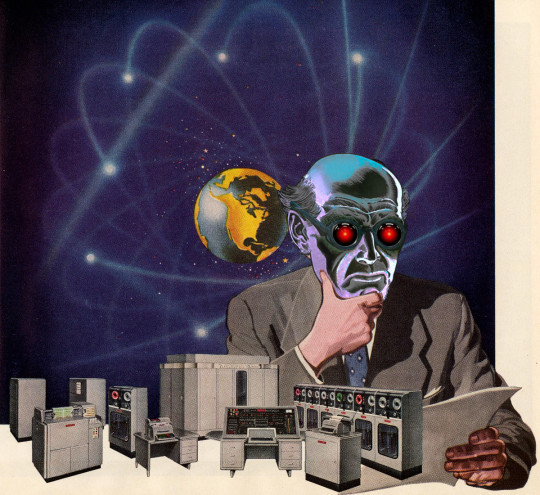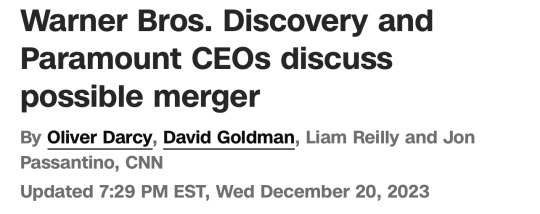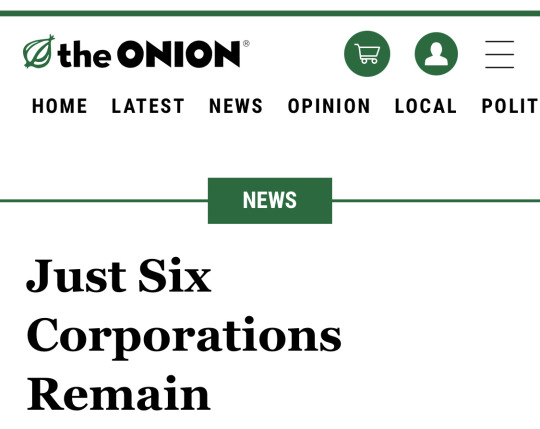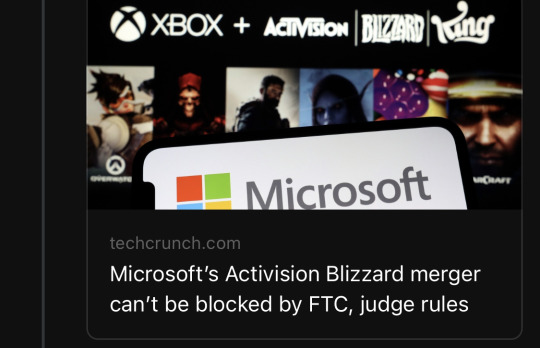#mergers and acquisitions
Text
Big Tech disrupted disruption

If you'd like an essay-formatted version of this post to read or share, here's a link to it on pluralistic.net, my surveillance-free, ad-free, tracker-free blog:
https://pluralistic.net/2024/02/08/permanent-overlords/#republicans-want-to-defund-the-police

Before "disruption" turned into a punchline, it was a genuinely exciting idea. Using technology, we could connect people to one another and allow them to collaborate, share, and cooperate to make great things happen.
It's easy (and valid) to dismiss the "disruption" of Uber, which "disrupted" taxis and transit by losing $31b worth of Saudi royal money in a bid to collapse the world's rival transportation system, while quietly promising its investors that it would someday have pricing power as a monopoly, and would attain profit through price-gouging and wage-theft.
Uber's disruption story was wreathed in bullshit: lies about the "independence" of its drivers, about the imminence of self-driving taxis, about the impact that replacing buses and subways with millions of circling, empty cars would have on traffic congestion. There were and are plenty of problems with traditional taxis and transit, but Uber magnified these problems, under cover of "disrupting" them away.
But there are other feats of high-tech disruption that were and are genuinely transformative – Wikipedia, GNU/Linux, RSS, and more. These disruptive technologies altered the balance of power between powerful institutions and the businesses, communities and individuals they dominated, in ways that have proven both beneficial and durable.
When we speak of commercial disruption today, we usually mean a tech company disrupting a non-tech company. Tinder disrupts singles bars. Netflix disrupts Blockbuster. Airbnb disrupts Marriott.
But the history of "disruption" features far more examples of tech companies disrupting other tech companies: DEC disrupts IBM. Netscape disrupts Microsoft. Google disrupts Yahoo. Nokia disrupts Kodak, sure – but then Apple disrupts Nokia. It's only natural that the businesses most vulnerable to digital disruption are other digital businesses.
And yet…disruption is nowhere to be seen when it comes to the tech sector itself. Five giant companies have been running the show for more than a decade. A couple of these companies (Apple, Microsoft) are Gen-Xers, having been born in the 70s, then there's a couple of Millennials (Amazon, Google), and that one Gen-Z kid (Facebook). Big Tech shows no sign of being disrupted, despite the continuous enshittification of their core products and services. How can this be? Has Big Tech disrupted disruption itself?
That's the contention of "Coopting Disruption," a new paper from two law profs: Mark Lemley (Stanford) and Matthew Wansley (Yeshiva U):
https://papers.ssrn.com/sol3/papers.cfm?abstract_id=4713845
The paper opens with a review of the literature on disruption. Big companies have some major advantages: they've got people and infrastructure they can leverage to bring new products to market more cheaply than startups. They've got existing relationships with suppliers, distributors and customers. People trust them.
Diversified, monopolistic companies are also able to capture "involuntary spillovers": when Google spends money on AI for image recognition, it can improve Google Photos, YouTube, Android, Search, Maps and many other products. A startup with just one product can't capitalize on these spillovers in the same way, so it doesn't have the same incentives to spend big on R&D.
Finally, big companies have access to cheap money. They get better credit terms from lenders, they can float bonds, they can tap the public markets, or just spend their own profits on R&D. They can also afford to take a long view, because they're not tied to VCs whose funds turn over every 5-10 years. Big companies get cheap money, play a long game, pay less to innovate and get more out of innovation.
But those advantages are swamped by the disadvantages of incumbency, all the various curses of bigness. Take Arrow's "replacement effect": new companies that compete with incumbents drive down the incumbents' prices and tempt their customers away. But an incumbent that buys a disruptive new company can just shut it down, and whittle down its ideas to "sustaining innovation" (small improvements to existing products), killing "disruptive innovation" (major changes that make the existing products obsolete).
Arrow's Replacement Effect also comes into play before a new product even exists. An incumbent that allows a rival to do R&D that would eventually disrupt its product is at risk; but if the incumbent buys this pre-product, R&D-heavy startup, it can turn the research to sustaining innovation and defund any disruptive innovation.
Arrow asks us to look at the innovation question from the point of view of the company as a whole. Clayton Christensen's "Innovator's Dilemma" looks at the motivations of individual decision-makers in large, successful companies. These individuals don't want to disrupt their own business, because that will render some part of their own company obsolete (perhaps their own division!). They also don't want to radically change their customers' businesses, because those customers would also face negative effects from disruption.
A startup, by contrast, has no existing successful divisions and no giant customers to safeguard. They have nothing to lose and everything to gain from disruption. Where a large company has no way for individual employees to initiate major changes in corporate strategy, a startup has fewer hops between employees and management. What's more, a startup that rewards an employee's good idea with a stock-grant ties that employee's future finances to the outcome of that idea – while a giant corporation's stock bonuses are only incidentally tied to the ideas of any individual worker.
Big companies are where good ideas go to die. If a big company passes on its employees' cool, disruptive ideas, that's the end of the story for that idea. But even if 100 VCs pass on a startup's cool idea and only one VC funds it, the startup still gets to pursue that idea. In startup land, a good idea gets lots of chances – in a big company, it only gets one.
Given how innately disruptable tech companies are, given how hard it is for big companies to innovate, and given how little innovation we've gotten from Big Tech, how is it that the tech giants haven't been disrupted?
The authors propose a four-step program for the would-be Tech Baron hoping to defend their turf from disruption.
First, gather information about startups that might develop disruptive technologies and steer them away from competing with you, by investing in them or partnering with them.
Second, cut off any would-be competitor's supply of resources they need to develop a disruptive product that challenges your own.
Third, convince the government to pass regulations that big, established companies can comply with but that are business-killing challenges for small competitors.
Finally, buy up any company that resists your steering, succeeds despite your resource war, and escapes the compliance moats of regulation that favors incumbents.
Then: kill those companies.
The authors proceed to show that all four tactics are in play today. Big Tech companies operate their own VC funds, which means they get a look at every promising company in the field, even if they don't want to invest in them. Big Tech companies are also awash in money and their "rival" VCs know it, and so financial VCs and Big Tech collude to fund potential disruptors and then sell them to Big Tech companies as "aqui-hires" that see the disruption neutralized.
On resources, the authors focus on data, and how companies like Facebook have explicit policies of only permitting companies they don't see as potential disruptors to access Facebook data. They reproduce internal Facebook strategy memos that divide potential platform users into "existing competitors, possible future competitors, [or] developers that we have alignment with on business models." These categories allow Facebook to decide which companies are capable of developing disruptive products and which ones aren't. For example, Amazon – which doesn't compete with Facebook – is allowed to access FB data to target shoppers. But Messageme, a startup, was cut off from Facebook as soon as management perceived them as a future rival. Ironically – but unsurprisingly – Facebook spins these policies as pro-privacy, not anti-competitive.
These data policies cast a long shadow. They don't just block existing companies from accessing the data they need to pursue disruptive offerings – they also "send a message" to would-be founders and investors, letting them know that if they try to disrupt a tech giant, they will have their market oxygen cut off before they can draw breath. The only way to build a product that challenges Facebook is as Facebook's partner, under Facebook's direction, with Facebook's veto.
Next, regulation. Starting in 2019, Facebook started publishing full-page newspaper ads calling for regulation. Someone ghost-wrote a Washington Post op-ed under Zuckerberg's byline, arguing the case for more tech regulation. Google, Apple, OpenAI other tech giants have all (selectively) lobbied in favor of many regulations. These rules covered a lot of ground, but they all share a characteristic: complying with them requires huge amounts of money – money that giant tech companies can spare, but potential disruptors lack.
Finally, there's predatory acquisitions. Mark Zuckerberg, working without the benefit of a ghost writer (or in-house counsel to review his statements for actionable intent) has repeatedly confessed to buying companies like Instagram to ensure that they never grow to be competitors. As he told one colleague, "I remember your internal post about how Instagram was our threat and not Google+. You were basically right. The thing about startups though is you can often acquire them.”
All the tech giants are acquisition factories. Every successful Google product, almost without exception, is a product they bought from someone else. By contrast, Google's own internal products typically crash and burn, from G+ to Reader to Google Videos. Apple, meanwhile, buys 90 companies per year – Tim Apple brings home a new company for his shareholders more often than you bring home a bag of groceries for your family. All the Big Tech companies' AI offerings are acquisitions, and Apple has bought more AI companies than any of them.
Big Tech claims to be innovating, but it's really just operationalizing. Any company that threatens to disrupt a tech giant is bought, its products stripped of any really innovative features, and the residue is added to existing products as a "sustaining innovation" – a dot-release feature that has all the innovative disruption of rounding the corners on a new mobile phone.
The authors present three case-studies of tech companies using this four-point strategy to forestall disruption in AI, VR and self-driving cars. I'm not excited about any of these three categories, but it's clear that the tech giants are worried about them, and the authors make a devastating case for these disruptions being disrupted by Big Tech.
What do to about it? If we like (some) disruption, and if Big Tech is enshittifying at speed without facing dethroning-by-disruption, how do we get the dynamism and innovation that gave us the best of tech?
The authors make four suggestions.
First, revive the authorities under existing antitrust law to ban executives from Big Tech companies from serving on the boards of startups. More broadly, kill interlocking boards altogether. Remember, these powers already exist in the lawbooks, so accomplishing this goal means a change in enforcement priorities, not a new act of Congress or rulemaking. What's more, interlocking boards between competing companies are illegal per se, meaning there's no expensive, difficult fact-finding needed to demonstrate that two companies are breaking the law by sharing directors.
Next: create a nondiscrimination policy that requires the largest tech companies that share data with some unaffiliated companies to offer data on the same terms to other companies, except when they are direct competitors. They argue that this rule will keep tech giants from choking off disruptive technologies that make them obsolete (rather than competing with them).
On the subject of regulation and compliance moats, they have less concrete advice. They counsel lawmakers to greet tech giants' demands to be regulated with suspicion, to proceed with caution when they do regulate, and to shape regulation so that it doesn't limit market entry, by keeping in mind the disproportionate burdens regulations put on established giants and small new companies. This is all good advice, but it's more a set of principles than any kind of specific practice, test or procedure.
Finally, they call for increased scrutiny of mergers, including mergers between very large companies and small startups. They argue that existing law (Sec 2 of the Sherman Act and Sec 7 of the Clayton Act) both empower enforcers to block these acquisitions. They admit that the case-law on this is poor, but that just means that enforcers need to start making new case-law.
I like all of these suggestions! We're certainly enjoying a more activist set of regulators, who are more interested in Big Tech, than we've seen in generations.
But they are grossly under-resourced even without giving them additional duties. As Matt Stoller points out, "the DOJ's Antitrust Division has fewer people enforcing anti-monopoly laws in a $24 trillion economy than the Smithsonian Museum has security guards."
https://www.thebignewsletter.com/p/congressional-republicans-to-defund
What's more, Republicans are trying to slash their budgets even further. The American conservative movement has finally located a police force they're eager to defund: the corporate police who defend us all from predatory monopolies.

Image:
Cryteria (modified)
https://commons.wikimedia.org/wiki/File:HAL9000.svg
CC BY 3.0
https://creativecommons.org/licenses/by/3.0/deed.en
#pluralistic#coopting disruption#law and political economy#law#economics#competition#big tech#tech#innovation#acquihires#predatory acquisitions#mergers and acquisitions#disruption#schumpeter#the curse of bigness#clay christensen#josef schumpeter#christensen#enshittiification#business#regulation#scholarship
284 notes
·
View notes
Text

I truly hate the fact that I accurately predicted something like this would happen back when Zaslav started cancelling everything.
Mergers fucking suck.
15 notes
·
View notes
Note
How do *you* feel about the Activision-Microsoft merger?

Mergers and acquisitions are normal in business. Over the course of my career, I've seen several large industry publishers merge or acquire other publishers, and dozens of independent studios get purchased by publishers.
Sega merged with Sammy Corp. in 2004 to form Sega-Sammy. Later they bought Atlus.
EA merged with Pandemic Studios + Bioware in 2007
Bandai and Namco merged in 2007
Activision merged with Vivendi Universal's games division in 2008 to form Activision-Blizzard
Bungie was purchased by Microsoft in 2000, bought itself out to go independent again in 2007, and was recently acquired by Sony in 2022.
Activision-Blizzard merged with King in 2015
Microsoft acquired ZeniMax in 2020
EA acquired Glu Mobile in 2021
Embracer Group bought Gearbox in 2021
Take Two bought Zynga in 2022
These kinds of behaviors are fairly normal in any major industry. Smaller companies fall on hard times and a larger company offers a rescue. Old leadership grows weary of running the company and someone offers them a big payday. Two like-minded sets of leadership decide that they would work better together.

In my opinion, the danger comes when too much consolidation happens and, instead of a market with plenty of competition, you end up with a cartel. It's not quite a monopoly with a single controlling company, but it's pretty close - a cartel is a handful of enormous organizations/companies that control the vast majority of the market and collude with each other in order to keep competition down and enrich themselves. In such a situation, they don't have to compete as hard anymore because they can take turns and help each other out. Any rising competition either gets bought or sabotaged by the combined might of the cartel.

Usually this happens because the cost for entering the market is really high - it's really risky to take that chance to compete with the cartel, which makes the newcomers much more vulnerable to cartel countermeasures. You can see this kind of corporate nonsense at work in many fields here in the US - there are only a handful of telecom companies, internet service providers, meat packing companies, train companies, cloud computing services, and so on. A big sign you're dealing with a cartel is when there aren't many options and none of them are particularly appealing.

I don't think that's happened in video games yet - we still have large independent publishers like Take Two, Steam, and EA, and we have medium-sized independent publishers like Capcom, Sega-Sammy, Bandai-Namco, Epic, and so on. But if the mega-corps keep buying up the bigger publishers, we'll probably end up in cartel territory and everything will suck.
[Join us on Discord] and/or [Support us on Patreon]
Got a burning question you want answered?
Short questions: Ask a Game Dev on Twitter
Long questions: Ask a Game Dev on Tumblr
Frequent Questions: The FAQ
#the business of video games#business business business numbers#mergers and acquisitions#economics of game development
48 notes
·
View notes
Text
tony your mom psychologically tormented you and gaslighted you into hating her until you really DID hate her and now you try to date women who do the exact same thing to you
4 notes
·
View notes
Text
I have been through a number of corporate acquisitions and mergers over the years. I have always been lucky and survived and I made it through once again. As has been the case for most of my life, I am truly blessed.
Today was the day I said goodbye to my colleagues who were not so fortunate. They were true professionals and held their heads up high as they walked out of the office for the last time. I have nothing but admiration for the way they conducted themselves in the face of adversity.
The office will not be the same without them. And survivors guilt is not fun.
14 notes
·
View notes
Text
2 notes
·
View notes
Text

North American M&A announcements moderated to $121b in July from $153b in June and a relatively high $193b in May (M&A-related IG issuance remained modest)
-baml
#funds #mergers #acquisition #deals #valuation #SFO #MFO #healthcare #biotech #LifeSciences #LBO #QT #PrivateEquity #investor #Fed #InterestRate #HedgeFunds #credit #Bank #Leveragedloan #privatedebt
https://twitter.com/mohossain/status/1672984641312026626?s=46&t=GtuOmoaTjOwevz2JidiiDQ @ennovance
6 notes
·
View notes
Text
damar could do American Psycho but could paul allen do cardassian leader?????????
20 notes
·
View notes
Text


One step closer to all restaurants being Taco Bell’s
2 notes
·
View notes
Link
7 notes
·
View notes
Text

Wealth Generation Made Simple!!!
Empower your health and wealth building potential and earn commissions while helping others do the same.
Our system takes away the challenges typically associated with building a traditional business and allows you to set in motion a passive income stream that offers you the most precious reward of all, financial freedom and the time to enjoy it with your friends and family.
Get started for free via the link below
https://www.aaoww.com/jesst
#make money websites#income#make money online#home & lifestyle#online free money#how to earn money#billionaire#work#rich#wealth#savings#investing#business#finance#commerce#banking#economie#mergers and acquisitions
3 notes
·
View notes
Text
SAP System Decommissioning: Streamlining Operations and Safeguarding Legacy Data

Introduction
In today’s fast-paced business environment, organizations constantly strive to optimize their technology landscape and streamline operations. As part of this process, SAP system decommissioning has emerged as a crucial strategy for effectively managing legacy systems and preserving valuable data. here, we will explore the concept of SAP system decommissioning and highlight its significance in enterprise resource planning (ERP).
What Is SAP System Decommissioning?
SAP system decommissioning refers to the planned retirement or deactivation of SAP systems that are no longer actively used by an organization. This process involves carefully archiving relevant data and ensuring compliance with data retention policies. By decommissioning obsolete or redundant SAP systems, companies can free up valuable resources and simplify their IT landscape.
As part of the decommissioning process, archiving SAP legacy data plays a crucial role in preserving historical information while ensuring accessibility when needed. Archiving SAP data involves extracting relevant data from the retired SAP systems, transforming it into a format suitable for long-term storage, and storing it securely. By archiving legacy data, organizations can meet legal and regulatory requirements, maintain historical records, and enable future analysis and reporting.
7 Reasons To Decommission Legacy Systems
SAP system decommissioning offers several advantages for organizations. Here are some key benefits:
1. Cost Savings:
Decommissioning outdated or redundant SAP systems can save significant costs. These systems often require maintenance, licensing fees, and hardware infrastructure, even if they are no longer actively used. Organizations can eliminate these ongoing expenses and allocate resources more efficiently by decommissioning such systems.
2. Enhanced Security:
Inactive SAP systems can pose security risks if not adequately maintained or updated. Decommissioning these systems reduces the attack surface and minimizes the chances of unauthorized access or data breaches. It helps organizations maintain a more secure IT environment and protect sensitive business data.
3. Streamlined IT Landscape:
Consolidating SAP systems through decommissioning simplifies the IT landscape. Reducing the number of systems lowers complexity, eliminates duplicate processes, and enhances overall system performance. It allows organizations to optimize resource utilization, reduce maintenance efforts, and improve operational efficiency.
4. Regulatory Compliance:
Decommissioning SAP systems while appropriately archiving necessary data helps organizations meet regulatory compliance requirements. By retaining and securely storing relevant data for the required retention periods, organizations can demonstrate compliance with industry-specific regulations and legal obligations.
5. Improved Data Management:
Archiving and retaining relevant data from decommissioned SAP systems enable organizations to better manage their historical information. It ensures data availability for future audits, analysis, reporting, and reference purposes. By implementing adequate data archiving strategies, organizations can maintain data integrity, accessibility, and long-term usability.
6. Business Agility:
Decommissioning SAP systems frees up valuable resources, including personnel, budget, and infrastructure. These resources can be redirected towards strategic initiatives, such as system upgrades, digital transformation projects, or new technology implementations. It enhances business agility and enables organizations to adapt to changing market demands more effectively.
7. Simplified System Maintenance:
By decommissioning unnecessary SAP systems, organizations reduce the complexity of system maintenance and support. This simplification streamlines system updates, upgrades, and troubleshooting efforts. It allows IT teams to focus on critical systems, ensuring higher service levels and faster response times. In summary, SAP system decommissioning offers tangible benefits in terms of cost savings, improved security, streamlined operations, regulatory compliance, enhanced data management, increased business agility, and simplified system maintenance.
#carve-out#it application decommissioning#mergers and acquisitions#sap system#system decommissioning#legacy system#insolvency#liquidation#SAP System Decommissioning
0 notes
Text
Terminally online weirdos do realize that if the proposed WB Discovery and Paramount merger goes through, thousands of people are going to end up losing their jobs, right?
As much as I despise Zaslav and everything he stands for, the world doesn’t need anymore mergers.
But I guess this is just another byproduct of late stage capitalism.
“Why stop at a single Looney Tunes movie when we can just buy the entire WB catalog?!”
This timeline sucks.
4 notes
·
View notes
Text
Mach10 Automotive Mergers and Acquisitions: Transforming the Road
Learn how Mach10 Automotive is influencing the future of the automotive industry by promoting innovation through well-timed mergers and acquisitions. Discover our innovative alliances and how we're changing the definition of mobility. Visit https://mach10automotive.com/team/ to learn more.

0 notes
Text
oh my god, to live in a time where "cuck" is so niche and so not part of the popular lexicon that audiences needed it explained for them, simpler times...
4 notes
·
View notes
Text
Enhancing M&A HR Consulting for Optimal Integration: Human Resource Dimensions

Human Resource Dimensions is superior in mergers and acquisitions HR consulting, offering a unique blend of expertise and innovation to streamline integration processes. As a reputable company, we are experts at offering complete solutions customized to your organization's unique requirements when it is going through a transformation. With a focus on driving synergy and maximizing value, we ensure that your M&A journey is not only successful but also sustainable in the long term. Reach us through our website.
0 notes